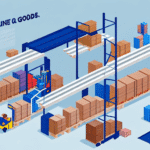Improving Order Fulfillment Efficiency Through Operational Excellence
Order fulfillment efficiency is a vital aspect of any successful business. With the rise of e-commerce and the growing customer demand for fast and reliable delivery, it has become even more important for businesses to optimize their order fulfillment processes. In this article, we will discuss the importance of order fulfillment efficiency, analyze the current order fulfillment process, identify key factors affecting order fulfillment efficiency, and explore how operational excellence can be implemented to improve efficiency. We will also cover real-world case studies, future trends, and the benefits of improving order fulfillment efficiency through operational excellence.
Understanding the Importance of Order Fulfillment Efficiency
The importance of order fulfillment efficiency cannot be overstated. Order fulfillment is one of the most critical parts of the customer experience, directly impacting customer satisfaction and the overall success of a business. Inefficient order fulfillment can lead to delayed deliveries, incorrect orders, and damaged products, which negatively affect customer satisfaction and retention. According to a Forbes report, 56% of customers have abandoned a purchase due to concerns about order fulfillment and delivery times.
Efficient order fulfillment benefits both customers and businesses by leading to increased sales, improved customer loyalty, and positive word-of-mouth marketing. Additionally, it helps businesses better manage their inventory, reduce waste, and optimize their supply chain, contributing to a more sustainable operation.
Several strategies can enhance order fulfillment efficiency, such as implementing automation technology, optimizing warehouse layout, and improving communication between departments. Regular evaluation and improvement of order fulfillment processes are essential to maintaining customer satisfaction and achieving overall business success.
Analyzing the Current Order Fulfillment Process
Process Mapping and Identification of Bottlenecks
Before implementing changes, it's essential to analyze the current order fulfillment process to identify areas of improvement. This involves mapping out the entire process and pinpointing bottlenecks or inefficiencies. Tools like Asana's process mapping can help visualize and streamline workflows.
Evaluating Technology and Workforce Skills
Assess the technology used in the current order fulfillment process. Outdated or inefficient technology can significantly slow down operations and lead to errors. Upgrading to advanced systems like Oracle's Warehouse Management System (WMS) can streamline processes and improve accuracy. Additionally, evaluating the training and skills of employees ensures they are equipped to handle modern fulfillment technologies effectively.
Key Factors Affecting Order Fulfillment Efficiency
Inventory Management
Effective inventory management is critical to ensuring that products are available when customers need them. Utilizing inventory management systems like InventorySource can help maintain optimal stock levels and reduce instances of stockouts or overstocking.
Warehouse Layout and Equipment
An optimized warehouse layout facilitates efficient order picking and packing. Implementing automated equipment such as conveyor belts and robotic picking systems can significantly increase efficiency and reduce errors. According to a McKinsey report, automation can boost warehouse productivity by up to 30%.
Staffing and Transportation
Adequate staffing ensures orders are processed promptly and accurately. Additionally, efficient transportation systems are essential for timely delivery. Partnering with reliable logistics providers and utilizing transportation management software can enhance delivery reliability and speed.
Customer Service
Providing clear and timely communication with customers regarding their orders helps prevent delays and ensures satisfaction. Offering flexible delivery options, such as same-day or next-day delivery, can enhance the customer experience and provide greater control over their orders.
Implementing Operational Excellence to Improve Efficiency
Continuous Process Improvement
Operational excellence involves continuously improving business processes to enhance efficiency and effectiveness. This includes streamlining processes, eliminating waste, and optimizing resources to boost overall performance. Implementing frameworks like Lean methodology can guide businesses in achieving operational excellence.
Cost Reduction and Increased Customer Satisfaction
One of the key benefits of operational excellence is cost reduction. Streamlining processes and eliminating waste leads to savings on resources, thereby improving the bottom line. Additionally, enhanced operational efficiency results in faster and more accurate order fulfillment, which increases customer satisfaction and loyalty.
Leveraging Technology to Improve Order Fulfillment Efficiency
Automation and Software Solutions
Technology plays a pivotal role in enhancing order fulfillment efficiency. Automated order picking and packing systems, inventory management software, and transportation optimization tools are essential for modern fulfillment operations. Solutions like SAP Warehouse Management provide comprehensive tools to manage and optimize fulfillment processes.
Reducing Errors and Streamlining Processes
Automated systems reduce human error in the picking and packing process, resulting in fewer mistakes and returns. This leads to increased customer satisfaction and loyalty. Additionally, technology enables the real-time monitoring of performance metrics, allowing businesses to identify and address inefficiencies promptly.
Measuring and Monitoring Performance Metrics for Continuous Improvement
Essential Performance Metrics
Developing and monitoring performance metrics is crucial for continuous improvement. Key metrics include order lead times, order accuracy, on-time delivery rates, and shipping costs. According to a PwC study, companies that regularly monitor these metrics outperform their peers by 33% in operational efficiency.
Aligning Metrics with Business Goals
Ensure that performance metrics are aligned with the organization's overall goals and objectives. This alignment guarantees that the metrics drive outcomes that contribute to business success. Regularly reviewing and updating these metrics ensures they remain relevant and effective in promoting ongoing improvement.
Training and Developing Employees to Optimize Efficiency
Skill Development and On-the-Job Training
Employee training and development are critical to maintaining order fulfillment efficiency. Providing regular training programs helps employees stay updated with the latest technologies and strategies. On-the-job training allows employees to learn by doing, which is particularly effective for hands-on tasks.
Career Growth and Employee Engagement
Offering opportunities for career growth and advancement increases employee motivation and engagement. When employees see a clear path for advancement, they are more likely to be productive and committed to their roles, leading to improved efficiency and lower turnover rates.
Case Studies: Real-World Examples of Successful Order Fulfillment Improvements
Clothing Retailer: Barcode Scanning Implementation
A leading clothing retailer implemented a barcode scanning system to track inventory, reducing picking errors by 50%. This improvement not only enhanced accuracy but also accelerated the fulfillment process, leading to higher customer satisfaction.
Transportation Optimization in Logistics
A logistics company adopted a transportation optimization system, resulting in a 20% reduction in transportation costs. By analyzing routing and delivery schedules, the company was able to streamline its logistics operations effectively.
Food Delivery Service: Real-Time Tracking System
A food delivery service introduced a real-time tracking system for their delivery drivers, allowing customers to track their orders in real-time. This innovation improved delivery times by 30% and reduced customer complaints by 40%, showcasing the importance of technology in enhancing fulfillment processes.
Future Trends in Order Fulfillment and Operational Excellence
Automation and Artificial Intelligence
The future of order fulfillment will be heavily influenced by automation and artificial intelligence (AI). These technologies will continue to improve efficiency and accuracy in fulfillment processes. According to a McKinsey report, AI-driven automation can reduce fulfillment costs by up to 30% by 2030.
Sustainability and Eco-Friendly Practices
There will be an increasing emphasis on sustainability in order fulfillment. Businesses will adopt environmentally friendly practices, such as using electric delivery vehicles and sustainable packaging materials, to meet consumer demand for greener operations.
Drones and Autonomous Vehicles
The use of drones and autonomous vehicles for delivery is expected to grow, significantly reducing delivery times and costs, particularly in urban areas. However, regulatory and safety concerns must be addressed before widespread adoption can occur. Companies like Amazon Prime Air are at the forefront of developing drone delivery systems.
Conclusion: The Benefits of Improving Order Fulfillment Efficiency Through Operational Excellence
Improving order fulfillment efficiency through operational excellence is critical to business success. Optimized order fulfillment processes lead to increased customer satisfaction, decreased costs, and improved productivity. Implementing strategies such as streamlining processes, leveraging technology, and continuous performance monitoring helps businesses identify areas for improvement and achieve ongoing excellence in order fulfillment. By prioritizing operational excellence, businesses can enhance their competitiveness in the marketplace and ensure long-term success.




















